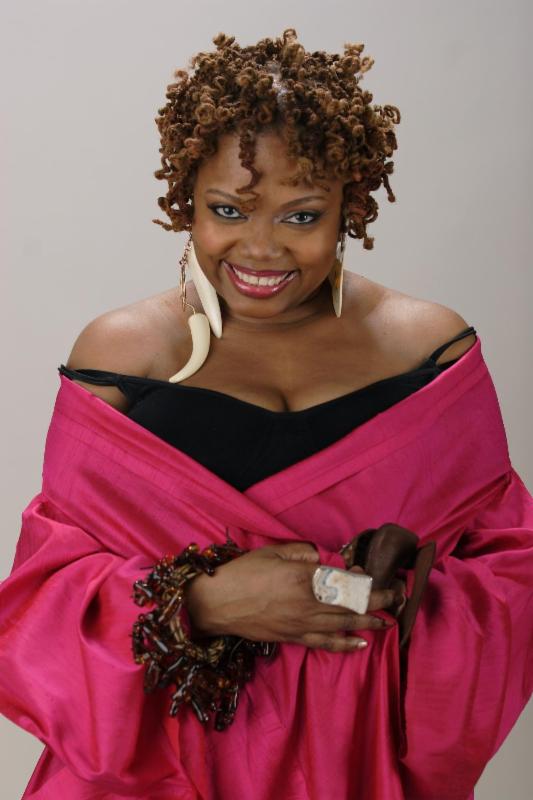
For Dee Alexander, music did not show up in her life in a music class, through a song on the radio, or something she read in a book or heard in a film.
Instead, the music that impacted her most as a young girl, and changed the course of her life, was what she heard every morning on the living-room phonograph, powered by her mother just minutes after she rose from her bed. All that music — the great singers, bandleaders, songwriters and more — started Alexander’s day for years before she herself found herself in their company as one of Chicago’s premier jazz vocalists.
“I would come into the kitchen, rubbing my eyes, and ask, ‘Who is that lady crying about ‘My man don’t love me/He treats me oh so mean.’ I’d ask my mother, and she’d just reply, ‘Billie Holiday.’ I loved it from the very start,” Alexander says.
That moment of her life is the foundation of “Songs My Mother Loves” (Blujazz), a recent album by Alexander that compiles a selection of songs she first heard while standing on that tile floor while waiting for her eggs to cook and toast to brown. For her Symphony Center debut Feb. 27, she’ll draw from the album, as well as other songs she has paid tribute to over the years by singers she admires: Holiday, Nina Simone, Sarah Vaughan and Dinah Washington.
“Great, great memories,” she says of the early days of first hearing those singers. “I am indebted to my mom.”
Alexander has been performing in Chicago for nearly four decades and regularly globe-trots the world with her combo that features musical director Miguel de la Cerna on piano, bassist Junius Paul and drummer Ernie Adams.

“Great, great memories,” says Dee Alexander, of the classic jazz singers who inspired her 2014 disc “Songs My Mother Loves.” “I am indebted to my mom.”
While internationally recognized for her inventive vocal style, she in recent years has earned notable respect stateside. Besides her performance at the 2013 Newport Jazz Festival and recent appearances at the Kennedy Center in Washington, D.C., and the Ravinia Festival in Highland Park, she was awarded a prestigious grant from 3Arts, a Chicago-based arts advocacy group, which she used to help fund the making of the new album.
Growing up on the West Side, she became involved early in her career with the Association for the Advancement of Creative Musicians, the non-profit collective of musicians, composers and vocalists who banded together to stretch the traditional boundaries of jazz, classical and African music. By the early 1980s, she started sitting in on late-night jam sessions and eventually became mentored by “Light” Henry Huff, the composer, saxophonist and harpist, and the potent force behind the group Breath. He then asked Alexander to join his band. The connection with the AACM also introduced to her years of future collaborators, including percussionist Baba Eli Hoenai, trumpeter Malachi Thompson, saxophonist and composer Ernest Dawkins, and pianist and bandleader Ken Chaney.
“That was the best classroom I could find,” she says. “It really opened me up in terms of ideas and taking different types of chances and trying different sounds. Those brothers are part of my family, and I am indebted to them.”
That lack of inhibition can be heard in Alexander’s singing, which freely defies convention and always seeks a challenge onstage. “There’s structure but you have to have the freedom to go outside the box,” she says. “And then you can come back into the box whenever you choose to.”
Indeed, throughout her career, Alexander has known few musical borders. Besides her early work with AACM artists, she spent 10 years in the Ken Chaney Xperience, an ensemble that combined funk with jazz. Then in the 1990s, she struck out on her own, recording successive albums under her own name and occasionally getting hired for session work, which has included two albums by Chicago R&B superstar R. Kelly.
But she always returned to jazz, her first love. Besides performing solo, she also heads Evolution Ensemble, a more experimental group that combines classical arrangements (cellist Tomeka Reid plays a prominent role) of an unusual repertoire (Jimi Hendrix, James Brown) using jazz instincts. Alexander formed the group initially as a tribune to Huff, her late mentor, with the idea they would play classical versions of his songbook. (“We were both good for each other in what we talked about, late at night at 3 or 4 in the morning. He really wasn’t bound by material things,” she says.) Occasionally, Alexander has merged her band with the ensemble to create a wider group, the Evolution Arkestra.
She also commits the same level of intensity in her personal life; it is not common for her to jump on a plane and play a string of festivals throughout Europe and then land back at O’Hare and go immediately to her office job at the Office of Research Services at the University of Illinois-Chicago, where she coordinates grant applications on four campuses.
“My son calls me the beast,” she says with a laugh. “It’s just about balancing yourself and being organized. If I thought about it, I wouldn’t know how I did it myself.”
She and her band are currently mulling over how to make their Symphony Center program extra-special. (Also on the SCP Jazz Series bill, appearing after intermission: Butler, Bernstein & the Hot 9.) But true to her roots, she is also ensuring they leave ample space for spontaneity.
“I don’t believe in over-rehearsing. That works for us because something always wonderful happens in the performance whenever we perform,” she says. “I guess there’s a method to my madness.”
Mark Guarino, contributing pop music critic for the Chicago Sun-Times, also writes for the Christian Science Monitor, the Guardian, the Washington Post, Salon, the Chicago Tribune, Agence France-Press and other outlets.